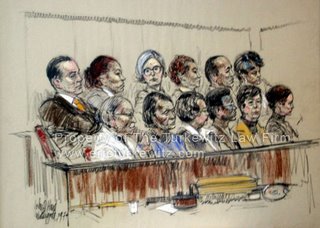 With oral argument scheduled for Monday in Wyeth v. Levine, three separate stories leaped off the screen at me. This included a devastating report of FDA officials being deeply opposed to Bush Administration policies regarding the issue of federal preemption of state law suits over drug cases, calling justification for new regulations “false and misleading.”
With oral argument scheduled for Monday in Wyeth v. Levine, three separate stories leaped off the screen at me. This included a devastating report of FDA officials being deeply opposed to Bush Administration policies regarding the issue of federal preemption of state law suits over drug cases, calling justification for new regulations “false and misleading.”
So here are the three stories in a nutshell: One from the standpoint of defendants, one from plaintiffs, and one from the government. (That’s plaintiff/musician Diane Levine at right. Her below the elbow amputation came from a drug injected in an improper manner that caused gangrene. The suit alleged, and the jury agreed, that the drug labels should have specifically warned that that type of injection should not be used.)
But before hitting those three posts, here is a quickie primer to get you up to speed in case you are late to the discussion, which I summarized a week ago (Preemption Gone Wild (How Bush Pushed Immunity for Big Business)). With preemption, a federal law that grants immunity will supersede a state law that allows lawsuits. But since President Bush couldn’t get Congress to agree to anti-consumer laws that grant immunity to corporations, drug companies try to argue that such preemption is implied by virtue of a conflict. Since there happens to be a presumption against preemption, that creates a problem for those corporations. They try to solve that problem with helpful politicians doing by executive fiat at an agency what they could not do in Congress; for example, by placing a corporate immunity clause in the preamble of an FDA rule that says if a drug is FDA approved, you can’t sue. Thus, drug companies ask the courts to imply that preemption exists even though it was not expressly legislated.
Now on to the three blogs:
First in the dock is the Drug and Device Blog — whose authors defend pharmaceutical companies from drug lawsuits — with Everything You Need To Know About Wyeth v. Levine, From A Defense Perspective. This lengthy piece summarizes all of their points about preemption and why drug companies deserve immunity if the FDA approves a drug, which is the number one thrust of this blog. The argument essentially ignores defects and under-funding in the drug-approval process.
Next up is from the Center for Justice and Democracy, a consumer rights group dedicated to preserving the civil justice system. They issued a report today: THE BITTEREST PILL — How Drug Companies Fail To Protect Women and How Lawsuits Save Their Lives. The report, according to the authors, “tells the story of the hyped marketing to women of a disproportionate number of unsafe drugs and devices resulting in countless deaths and injuries.” As you may guess, they aren’t too keen on immunity being granted to a company that was negligent, and whose negligence injured people. It’s part of that whole personal responsibility thing that conservatives usually talk about, except when it comes to big business.
And last up comes from Pharmalot, with this — Report: FDA Staff Objected To Preemption Policy. Here is the devastating lede:
Key FDA career officials strongly objected to Bush Administration drug labeling regulations that would preempt state liability lawsuits, according to a report just released by the Committee on Oversight and Government Reform. The staffers viewed the justifications for the regs were “false and misleading” and warned the changes would deprive consumers of timely info about drug safety, the report concludes.
This report is like sticking a dagger into the heart of the drug companies that argue for preemption because a drug is FDA-approved. For if the approval process is tainted, then we have the age-old problem of garbage-in-garbage-out.
I’ve filed this under tort “reform” because that is what it is. Except is a way of closing the courthouse door by a quiet administrative rule rather than a policy fight in a legislative body.
See also:



